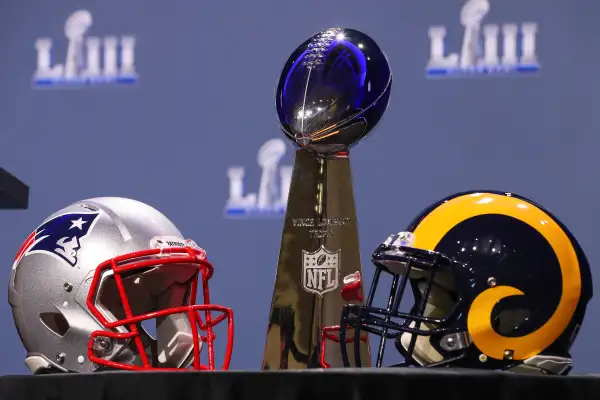Should You Bet on the Rams or Patriots to Win Super Bowl 2019? Here Are the Current Odds

On Sunday, February 3, the Los Angeles Rams take on the New England Patriots in Super Bowl LIII. Half the American population will tune in to CBS for the game that kicks off at 6:30 p.m. EST, and — as the biggest sporting event in the U.S. — it’ll be one of the biggest betting days of the year.
One in every 10 American adults will be betting a total of $6 billion on Sunday’s game, based on a survey conducted by the American Gaming Association. And, because of a May 2018 ruling to leave the decision up to each state, this is the first Super Bowl that legal sports betting won’t be restricted to Nevada, which means more first-timers.
"Just try to have fun and keep it in that perspective," advises Chris Andrews, a seasoned veteran in the industry and the sportsbook director at the South Point Hotel Casino and Spa in Las Vegas. "I think this is going to be a really close game, so if you’re going to put your mortgage money on one of the sides, I would tell you don’t do that."
The type of bets worth knowing are the point spread, the moneyline, and the over-under — and they’re all based on odds set by a sportsbooks like Andrews' or online ones like Bovada. The odds vary slightly from book-to-book and change here and there in the days leading up to the Super Bowl as more people weigh in with their wagers (the following odds were calculated on Friday, Feb. 1 at noon). But resources like Odds Shark compile information from the most reliable sportsbooks so that they’re always in the right ballpark.
For all of these types of bets below, note that the total win is the bettor’s profit plus their wager. The loss is just the wager.
What’s the point spread?
The point spread is the number of points that oddsmakers expect the favored team to beat the underdog by.
Currently, the spread for the Super Bowl is 2.5 with the New England Patriots as the favorite (this is also seen written as “New England Patriots -2.5” or “Los Angeles Rams +2.5”). And yes, it’s impossible to win by 2.5 points, so if you bet on the Patriots, they have to win by 3 points or more for you to make a profit. If you bet on the Rams, the Patriots have to win by less than 3 points or lose.
A point spread’s odds make the wager a little more interesting. The Patriots have won five Super Bowls, all within the last 20 years. But the five-time champions have only “covered the spread” (A.K.A won by at least as many points as oddsmakers said they would) once in NFL history.
What’s the moneyline?
A moneyline bet on the score is simply “Which team will win?” so the exact points don’t matter.
But you’ll win more money if you bet a dollar on the underdog than if you bet a dollar on the favorite, because the odds are set up to give you a higher reward for a higher risk.
For Super Bowl 2019, the moneyline odds are currently Los Angeles Rams +130 and New England Patriots -150. Translated, that means that a $100 bet on the Rams makes you $130 if the Rams win. The same $100 on the Patriots, however, would only result in a $67 profit in a Patriots win.
“If you’re betting the Rams, then the moneyline is definitely riskier [than the point spread], and that’s why you get a better return,” Andrews said. “On the Patriots, [the point spread] is a little riskier… because now they’re going to have to win by three.”
But betting on the spread for the Patriots also means betting $150 instead of $110 for the same $100 return.
“And therein lies the rub,” he says.
Okay, forget who wins. What’s the over-under?
If a moneyline bettor only cares about who wins, the over-under bettor only cares about the total number of scored points; more specifically, whether it was more or less than what the oddsmakers forecasted.
The over-under for Super Bowl LIII is 56.5 right now, and the pay to play is generally -110 for either side of the bet. So anyone who bets $100 on the over wins $91 if the teams score a combined 57 points or more, and anyone who bets that $100 on the under wins $91 if the two teams score 56 points or less.
It’s been pretty evenly split since the first over-under bet was set in SB II — over the forecast 27 times and under it 24 times. The score for the over-under was set at a record-high when betting opened to the public this year, but in the last decade, the final score has only been under three times.
Andrews says not to put too much statistical significance on these short-term patterns, but mentioned one pattern that professional bettors are staying true to in 2019.
The public almost always bets the over, which Andrews attributes to a psychological desire for a high-scoring game, but professionals bettors tend to bet the under, based on analytics and crunching numbers.
What if I don’t care about who wins OR how much they score?
Then proposition bets — also known as “prop” bets — will keep you entertained on Sunday.
There are football-related prop bets, but a lot of prop bets have little to do with the game, like whether or not Chick-fil-A will break its “Closed on Sundays” rule since Super Bowl LIII takes place in a stadium with a Chick-fil-A in it. Prop bets are set up like moneyline bets, meaning bettors see the odds and put stakes down accordingly.
Arguably the most popular prop bet is the coin toss. There’s a 50-50 chance of winning (it’s been heads for 25 Super Bowls and tails for 27) and since the house gets the money from the half that loses, they keep it pretty profitable. They’re both always -105, meaning a $100 bet either way gets you $95.
Or, as betting goes, $100 down the drain.
Here are some more of this year’s prop bets with only two likelihoods — the dollar amounts below don't include the wager (which the bettor gets back if they win):
